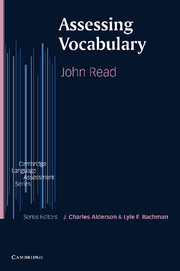Book contents
- Frontmatter
- Contents
- Series editors' preface
- Acknowledgements
- 1 The place of vocabulary in language assessment
- 2 The nature of vocabulary
- 3 Research on vocabulary acquisition and use
- 4 Research on vocabulary assessment
- 5 Vocabulary tests: four case studies
- 6 The design of discrete vocabulary tests
- 7 Comprehensive measures of vocabulary
- 8 Further developments in vocabulary assessment
- References
- Index
Series editors' preface
Published online by Cambridge University Press: 03 May 2010
- Frontmatter
- Contents
- Series editors' preface
- Acknowledgements
- 1 The place of vocabulary in language assessment
- 2 The nature of vocabulary
- 3 Research on vocabulary acquisition and use
- 4 Research on vocabulary assessment
- 5 Vocabulary tests: four case studies
- 6 The design of discrete vocabulary tests
- 7 Comprehensive measures of vocabulary
- 8 Further developments in vocabulary assessment
- References
- Index
Summary
This book in the Cambridge Language Assessment Series is both timely and authoritative. It is timely because, after many years of neglect, the study of vocabulary in applied linguistics is now flourishing. Research on vocabulary has made a significant contribution to this development and will assume greater importance as researchers and practitioners recognise the need for a stronger theoretical foundation for their work and for more sophisticated ways of measuring vocabulary knowledge and use.
It is also authoritative because it is written by a scholar who has devoted many years to the study of vocabulary in the context of second and foreign language learning, teaching and assessment. John Read is at the forefront of recent work in the area, and in this book provides us with an in-depth consideration of how the results of empirical research and thoughtful scholarship can be applied to assessment. The book is unique in bringing together the most important empirical research in this area for reference by test developers and classroom teachers. This reflects the fact that Read is not only a researcher on vocabulary assessment but also a language teacher familiar with the challenges faced by students acquiring vocabulary in a second language as well as by their teachers in assessing what the learners have acquired.
Having established what is known about vocabulary knowledge and use, and how this might be measured, Read then deals at length with the implications for vocabulary assessment.
- Type
- Chapter
- Information
- Assessing Vocabulary , pp. ix - xPublisher: Cambridge University PressPrint publication year: 2000



